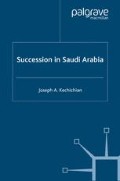Abstract
The Al Saud family articulated two major security goals throughout its 65-year rule: to maintain custodianship over the holy sites of Makkah and Madinah and to preserve the commanding role of the ruling family. Both, it was posited by every ruler, ensured their legitimacy and, as a consequence, their power. Both provided stability and preserved the Kingdom from internal challenges.
Access this chapter
Tax calculation will be finalised at checkout
Purchases are for personal use only
Preview
Unable to display preview. Download preview PDF.
Notes
H. St. John Philby, Saudi Arabia, London: Ernest Benn Ltd., 1955, p. 297.
John S. Habib, Ibn Saûd’s Warriors of Islam: The Ikhwan of Najd and Their Role in the Creation of the Sa‘udi Kingdom, 1910–1930, Leiden, the Netherlands: E. J. Brill, 1978, pp. 136–142.
David Holden and Richard Johns, The House of Saud: The Rise and Rule of the Most Powerful Dynasty in the Arab World, New York: Holt, Rinehart and Winston, 1981, pp. 55–79.
Nadav Safran, Saudi Arabia: The Ceaseless Quest for Security, Boston: Harvard University Press, 1985, p. 74.
David Holden, “A Family Affair,” The New York Times Magazine July 6, 1975, pp. 8–9, 26–27.
For two thorough studies on Aramco and the myriad developments associated with the giant company, see Irvine H. Anderson, Aramco, the United States, and Saudi Arabia: A Study of the Dynamics of Foreign Oil Policy, 1933–1950, Princeton, New Jersey: Princeton University Press, 1981;
Anthony Cave Brown, Oil, God, and Gold: The Story of Aramco and the Saudi Kings, Boston: Houghton Mifflin Company, 1999.
Joseph A. Kechichian, “The Role of the Ulama in the Politics of an Islamic State: The Case of Saudi Arabia,” International Journal of Middle East Studies 18: 1, February 1986, pp. 53–71.
David Tinnin, “Saudis Recognize Their Vulnerability,” Fortune March 10, 1980, p. 48.
James Dorsey, “After Mecca, Saudi Rulers Provide a Channel for Dissent,” The Christian Science Monitor March 14, 1980, p. 7.
R. Hrair Dekmejian, Islam in Revolution: Fundamentalism in the Arab World Syracuse, New York: Syracuse University Press, 1985, pp. 137–148. See also Plascov, op. cit. p. 19.
For a thorough analysis, see Fred Frostic, Air Campaign Against the Iraqi Army in the Kuwaiti Theater of Operations, MR-357-AF, Santa Monica, California: RAND, 1994.
Geoff Simons, Saudi Arabia: The Shape of a Client Feudalism, New York: St. Martin’s Press, 1998, pp. 328–335.
Joseph A. Kechichian, “Trends in Saudi National Security,” The Middle East Journal 53:2, spring 1999, pp. 232–253.
R. Hrair Dekmejian, “Saudi Arabia’s Consultative Council,” The Middle East Journal 52:2, spring 1998, pp. 204–218.
Khaled bin Sultan, Desert Warrior: A Personal View of the Gulf War by the Joint Forces Commander. New York: HarperCollins Publishers, 1995, p. 173.
George Bush and Brent Scowcroft, A World Transformed. New York: Alfred A. Knopf, Inc., 1998, p. 320.
Copyright information
© 2001 Joseph A. Kechichian
About this chapter
Cite this chapter
Kechichian, J.A. (2001). Perceptions of Security Concerns. In: Succession in Saudi Arabia. Palgrave Macmillan, New York. https://doi.org/10.1057/9780312299620_4
Download citation
DOI: https://doi.org/10.1057/9780312299620_4
Publisher Name: Palgrave Macmillan, New York
Print ISBN: 978-1-349-99954-5
Online ISBN: 978-0-312-29962-0
eBook Packages: Palgrave Political & Intern. Studies CollectionPolitical Science and International Studies (R0)

